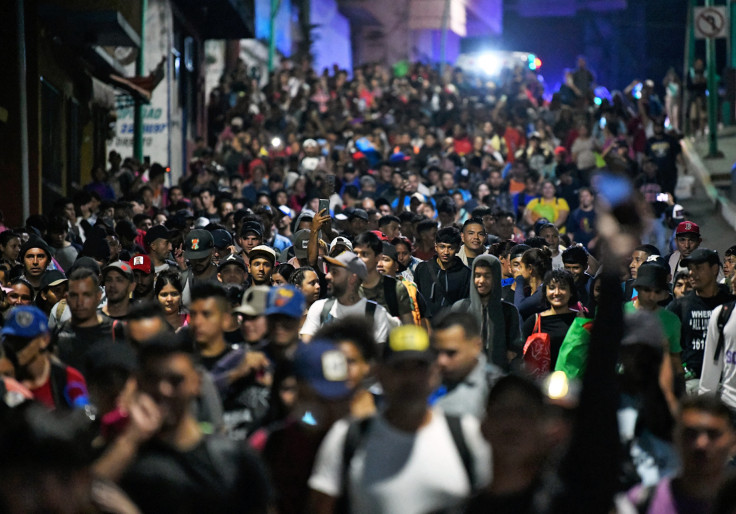
Since President Donald Trump took office back in January, the number of migrants seeking to cross the border and seek asylum has plummeted. But said migrants haven't disappeared or remain in their home countries. Instead, many of them are stuck in northern Mexico, looking for ways to continue their journey north and make a new life in the U.S.
Thousands of migrants are currently residing in Mexico's borders, stuck in a legal and economic limbo between Mexico and the U.S. In fact, at least 3,000 Venezuelans are stranded in Tapachula, a sweltering city near the southernmost point of Mexico that was once a gateway for migrants entering Guatemala, according to The New York Times.
Up north, in the bordering cities of Matamoros and Reynosa, some 500 migrants, the majority from Honduras, Venezuela and Colombia, have sought refuge in two shelters operated by local religious groups, according to Noticias Telemundo. The location of these cities often makes it increasingly difficult for migrants to have jobs and eventually achieve economic independence, continuing a cycle of poverty. Migrants also are not allowed to travel to other cities within Mexico due to a lack of government authorization.
"They can't get on a bus. First, they won't sell them tickets. They won't sell them tickets because what's required is that the migrant has a specific date and a flight or a pass. I've wanted to take some people from Matamoros to Monterrey, either by van or by looking for someone to take them. We can't because of the legal issue they have right now, and if there are checkpoints, they ask for identification," said Francisco Gallardo, a priest from the Diocese of Matamoros-Reynosa and the coordinator of the Migrantre Nuestra Señora de Guadalupe, one of the migrant shelters in the city.
Nevertheless, for these foreigners, returning home is not an option, and the U.S. remains their ultimate destination.
That is the case for Luzmar Castillo, a Venezuelan migrant living in Matamoros with her husband, who is working as an electrician there. She says that this income isn't enough to leave the shelter and rent a house. They have no work permits in Mexico and rarely go out because they don't want to be detained by immigration officials. Despite these conditions, they maintain hope of crossing into the U.S. one day.
"Our goal wasn't Mexico. But hey, if God wanted it that way, there must be a reason... We don't have the resources to return [to Venezuela], so we have no choice but to wait, hoping this will be fixed or that President Trump will change his mind about migrants," Castillo told Noticias Telemundo.
"Or wait for him (Trump) to leave and for another government to come in and see what happens to us migrants," she added.
Honduran migrants Carolina Banegas and her partner Kelvin Murillo expressed similar sentiments.
"We haven't lost hope that some door will open for us to enter the United States. We haven't lost hope, but if not, there always has to be a plan B. Plan B is to regularize our status here in Mexico. We're already in the process of doing so. We've already submitted paperwork to Comer (the Mexican Commission for Refugee Assistance) and we're in the process of legalizing our status," Murillo said.
By contrast, those willing to leave the country face hurdles, with many lacking valid passports, transit permits or identity documents. Those with no means to make the long journey must wait to get selected for a humanitarian flight provided by Mexico— and for the Venezuelan government to approve their return.
There are currently thousands of people on the waiting list for a flight to Venezuela, according to an official who was speaking to migrants but refused to give her name because she was not allowed to talk to journalists.
"This is like being in prison because we can't go anywhere," said Mari Angeli Useche, 24, who left Venezuela eight months ago, hoping to reach the United States, and now hopes she can get on a humanitarian flight to Venezuela before giving birth.
Hours upon returning to the White House, President Trump declared the situation at the southern border an "invasion," citing the need to protect states as a reason to effectively shut down the border, preventing undocumented migrants from entering the country. Hence, the administration also ended asylum protections at the southern border, preventing migrants from seeking humanitarian protection until said "invasion" is deemed over.
© 2025 Latin Times. All rights reserved. Do not reproduce without permission.




